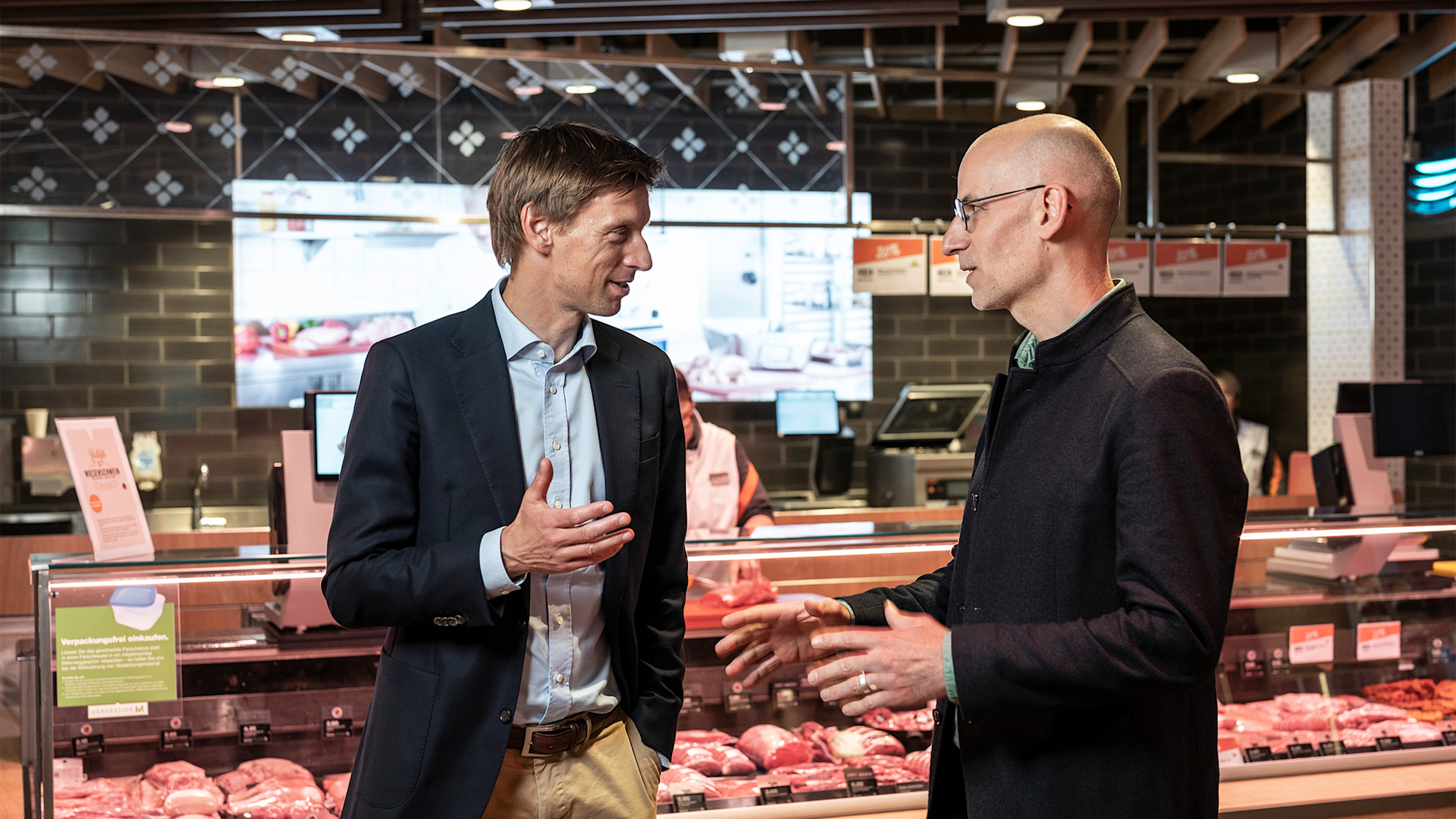
Farewell, dear Jules Kyburz
Obituary of Jules Kyburz, former President of the FMC Executive Board, who has died at the age of 93.
navigation

Double interview on organic products
Some organic products cost more than their conventionally-produced counterparts. In this interview, the Managing Director of Bio Suisse and the Head of Marketing at Migros explain why that is – and why organic still needs to become cheaper.
Matthias Wunderlin: Today’s prices reflect the higher manufacturing and processing costs. You can keep fewer animals per square metre in an organic pigsty, for example. Nonetheless, I’m convinced we urgently need to bring organic out of its niche. Otherwise, the positive impact on the environment will remain on a small scale.
Balz Strasser: The Bio Suisse guidelines are some of the most stringent in the world. Animal welfare, biodiversity and environmental protection involve a lot of extra effort, which brings with it additional costs. But there is a different question that occurs to me here: aren’t conventionally-manufactured products too cheap? Synthetic pesticides pollute our drinking water, which then needs to be filtered at great cost. But rather than paying for this in the purchase price, we pay for it indirectly via taxes.
Balz Strasser: If we produce more organic products, the unit cost will fall. A business that produces only organic cheese has simpler processes and, therefore, lower costs than a company that makes both organic and conventional cheese. We need policy-makers to play their part, too. For instance, the EU wants agriculture to be 25-per-cent organic by 2030, and there are demands to cut VAT on organic products.
Matthias Wunderlin: I take a more critical view of that, as it would make the subsidy system even less transparent. There are things we can tackle today without waiting for policy-makers. With some products, we’ve simply missed the boat in terms of making sure there are enough producers, although the demand would be there …
Balz Strasser: I personally believe that a business should only switch to organic out of firm conviction. If the conditions are in place and the demand is there, the producers will make the switch freely and independently.
While an organic product doesn’t need to be perfect, the Organic Farming Ordinance states that it has to be 100-per-cent organic.
Matthias Wunderlin: But if we want to make the whole system more sustainable, then the share of products labelled "organic" needs to grow. What’s the point in having a perfect product if only two per cent of the population buy it? It would make more sense to have a product that is 90-per-cent perfect, and which 30 per cent or more of people buy.
Balz Strasser: An organic product doesn’t need to be perfect, but the Swiss Organic Farming Ordinance states that it has to be 100- per-cent organic. And the prices for producers need to be fair. If there is a sudden surplus, the prices will fall. Retailers might welcome that in the short term, but we will then start to lose producers, as the extra effort and expense is just not worth it for them at that point.
Balz Strasser: Retailers have great leverage. If product ranges such as bread and sugar switch to organic on a large scale, as Migros is doing now, then the producers will follow. Migros could decide to do exactly the same thing for other products.
Matthias Wunderlin: Exactly! We’ve been doing that for some time now. All of our bottled milk and eggs now meet IP-Suisse quality requirements at the very least. This would also be conceivable for organic products if the prices were right. And that’s not always the case, particularly when it comes to meat. It’s easy to sell organic fillet, less so organic minced meat. But the animal doesn't consist entirely of fillet.
Balz Strasser: Some organic producers really do think that there is no need for any more of them. Rifts are beginning to appear as the guidelines develop, too. Some people feel they’re not stringent enough and lack the idealism of the early years, while others find them far too stringent. However, the bottom line is that the number of organic producers is increasing year on year; we are on track.
Matthias Wunderlin: Migros needs to bring organic into the mainstream to a certain extent in order to achieve its own sustainability targets. That's one reason why it's absurd to suggest we would artificially inflate the price of organic produce. Our organic profit margins are no higher than in the conventional segment. Organic is more expensive, but it's not making anyone rich.
Balz Strasser: Every stakeholder in the organic value chain – whether they are a producer, a distributor, a processor or a retailer – needs to, and should be allowed to, make some money. Otherwise, the system is not sustainable. However, profit margins need to remain fair – at every stage of the value chain. We address this issue regularly with all our partners.
Matthias Wunderlin: There's something very important I want to say here: Migros is a cooperative for its customers. We don’t get bonuses, and nobody here gets a pay rise if they exceed their end-of-year targets. Our job is to give our customers good value for money.
Balz Strasser: Our guide prices for organic raw materials are an extremely effective tool in this respect. We occasionally hear from producers who are feeling the pressure and, in some cases, we get involved and seek dialogue with the retailers.
Balz Strasser: I’m very grateful for the partnership with Migros and appreciate its efforts to become more sustainable. I would like the organic producers to always receive fair reward for the extra work they do, including when it comes to the many promotions of organic products.
Matthias Wunderlin: You want fewer organic promotions?
Balz Strasser: No, we welcome promotions, particularly when there is a surplus.
Matthias Wunderlin: Organic promotions actually work very well, because they make the products affordable for a wider section of the population. So the price actually does play a part.
Balz Strasser: We are in favour of cheaper prices, too, provided the producers can cover their costs. If that's no longer the case at certain prices, that's when I start to worry about it.
Matthias Wunderlin: Bio Suisse may not be able to avoid looking at its numerous guidelines and precisely weighing up the costs and benefits individually on a case-by-case basis. The same applies to Migros and its processes. Bio Suisse is the standard for organic products in Switzerland; that's why we are involved, and we would like to work with you to develop it further.
Balz Strasser: Ultimately, we are in the same boat. If we want to make real progress, the only way to do that is by working together.